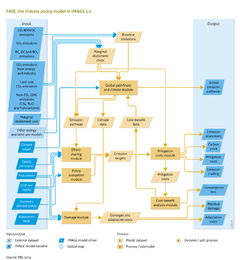Climate policy: Difference between revisions
Jump to navigation
Jump to search
No edit summary |
No edit summary |
||
| Line 2: | Line 2: | ||
|Status=On hold | |Status=On hold | ||
|ComponentCode=CP | |ComponentCode=CP | ||
|InputVar=Population per Region; GDP per capita; CO2, other GHG, CO, NMVOC emissions; Marginal abatement cost; Climate policies; Marginal abatement cost; | |InputVar=Population per Region; GDP per capita; CO2, other GHG, CO, NMVOC emissions; Marginal abatement cost; Climate policies; Marginal abatement cost; | ||
|OutputVar=Emission abatement; Carbon price; | |OutputVar=Emission abatement; Carbon price; | ||
|FrameworkElementType=policy respons | |FrameworkElementType=policy respons | ||
|Description=In the United Nations climate negotiations, urgent action was called for to limit global warming to 2 °C. In order to reach this climate goal, countries have proposed short and long term actions, both within the UNFCCC climate negotiating process and in domestic policies. To support climate policy-makers, the IMAGE model is able to quantitatively evaluate and address different kinds of policy questions. For this, the IMAGE model is mostly used in conjunction with the FAIR model. The FAIR model is a decision-support tool to analyze the costs, benefits, and climate effects of mitigation regimes, emission reduction commitments, and climate policies. | |Description=In the United Nations climate negotiations, urgent action was called for to limit global warming to 2 °C. In order to reach this climate goal, countries have proposed short and long term actions, both within the UNFCCC climate negotiating process and in domestic policies. To support climate policy-makers, the IMAGE model is able to quantitatively evaluate and address different kinds of policy questions. For this, the IMAGE model is mostly used in conjunction with the FAIR model. The FAIR model is a decision-support tool to analyze the costs, benefits, and climate effects of mitigation regimes, emission reduction commitments, and climate policies. | ||
}} | }} | ||
Revision as of 10:49, 24 September 2013
| Component is implemented in: |
|
| Related IMAGE components |
| Models/Databases |
| Key publications |
| References |
Key policy issues
- What global greenhouse gas emissions pathways would meet the well below 2 °C climate target?
- What is the effect of effort-sharing approaches on regional and national emission reduction targets and on the cost of climate policies?
- What is the effect of the NDCs on achieving the long term 2 ºC target?
- What are the trade-offs between mitigation costs, adaptation costs, and climate change damage?
Introduction
"policy respons" is not in the list (driver component, pressure component, interaction component, state component, impact component, response component) of allowed values for the "FrameworkElementType" property.
